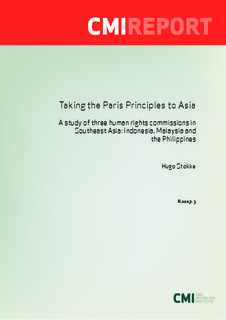Taking the Paris Principles to Asia. A Study of Three Human Rights Commissions in Southeast Asia: Indonesia, Malaysia and the Philippines
Research report
Permanent lenke
http://hdl.handle.net/11250/2436107Utgivelsesdato
2007Metadata
Vis full innførselSamlinger
- Bora-import [434]
Sammendrag
The report studies three human rights commissions in Southeast Asia in light of the so-called Paris Principles. These principles are the authoritative guidelines for directing the work of national human rights institutions. Designed as agencies for both the promotion and protection of human rights, these entities occupy an important intermediate position between the state and civil society. They are to serve as public watchdogs over the state and to be accessible to the public at large as agencies investigating complaints about state wrongdoing and as sources of education and training for raising human rights awareness.
The report makes an assessment of the legal mandate, composition, independence, operational priorities and to the extent possible, the effectiveness and impact of the three commissions in Indonesia, Malaysia and the Philippines. Although the assessment finds that the three fulfil the requirements of the Paris Principles, there is still considerable room for improvement for all three. All three commissions are also found to vary in significant respects and this variation is sought summarised in a concluding table. Finally, some recommendations are made as to how the performance of the commissions can be bettered.
The general weakness of the commissions is that their mandates are not as encompassing as they should be and that they have few powers to make sure that their recommendations are followed once they are submitted to the relevant government authority. The strict separation between the commissions and the courts also derives the commissions of any judicial function.
Utgiver
Chr. Michelsen InstituteSerie
Research reportR 2007: 3
